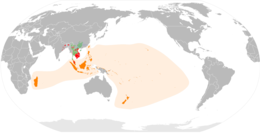Lingue austriche
La superfamiglia linguistica delle lingue austriche è una costruzione teorica raggruppante alcune lingue parlate nel sud-est asiatico, in Oceania e nel sub-continente indiano. Questa super-famiglia riunirebbe le famiglie austronesiana e austroasiatica. L'ipotesi di una relazione genetica tra queste due famiglie, non è però accettata dalla maggioranza dei linguisti.
| Lingue austriche | |
|---|---|
| Parlato in | Sud-est asiatico, India |
| Tassonomia | |
| Filogenesi | Proposta di superfamiglia linguistica |
| Codici di classificazione | |
| ISO 639-2 | -
|

Lingue Austro-asiatiche
Lingue Austronesiane
Lingue Tai-kadai
Lingue Hmong-Mien | |
Storia
modificaL'idea di una superfamiglia austrica fu suggerita per la prima volta, nel 1906 dal missionario ed antropologo tedesco Wilhelm Schmidt, il quale avanzava argomentazioni di tipo fonologico, morfologico e lessicale per dimostrare l'esistenza della superfamiglia. Ma gli elementi lessicali furono rigettati dalla comunità dei linguisti. L'ipotesi austrica venne, quindi, generalmente, non accettata.
Nel 1942, il linguista Paul King Benedict (1912-1997) propose una superfamiglia che includeva non solo le lingue austronesiane ed austroasiatiche, ma anche le lingue tai-kadai e le lingue hmong-mien (o miao-yao). Anche quest'ipotesi, oggigiorno, è quasi universalmente rigettata.
Altri linguisti hanno pensato che similitudini morfologiche, recentemente scoperte tra le lingue nicobaresi (appartenenti alla famiglia delle lingue mon-khmer, quindi austroasiatiche) e l'austronesiano, dimostrerebbero l'esistenza di una relazione tra l'austronesiano e l'austroasiatico.[2]
Classificazione
modificaIl seguente schema di classificazione, proposto da Paul K. Benedict, è quello generalmente più accettato. Le lingue hmong–mien vengono occasionalmente incluse, ma solitamente non vengono considerate facenti parte della superfamiglia austrica.
| Austrico |
| ||||||||||||||||||
Sergei Starostin, invece, divide l'austrico in due rami principali. Il ramo austrico, che può essere considerato piuttosto vicino alle lingue denecaucasiche, forma la superfamiglia dene-daica[3].:
| Austrico |
| ||||||||||||||||||
Note
modifica- ^ Alexander Vovin: Proto-Japanese beyond the accent system. In: Bjarke Frellesvig & John Whitman (Hrsg.): Proto-Japanese: Issues and Prospects. 2008, S. 141–156
- ^ (EN) The "Greater Austric" Hypothesis
- ^ George van Driem, Sino-Austronesian vs. Sino-Caucasian, Sino-Bodic vs. Sino-Tibetan, and Tibeto-Burman as default theory Archiviato il 26 luglio 2011 in Internet Archive., Contemporary Issues in Nepalese Linguistics, 2005, pp. 285-338 (si veda pag. 309)
Bibliografia
modifica- Benedict, Paul K. 1976. Austro-Thai and Austroasiatic. In: Philip N. Jenner, Laurence C. Thompson, and Stanley Starosta, eds., Austroasiatic Studies, Part I, pp. 1–36. Honolulu: University of Hawai‘i Press.
- Blazhek, Vaclav. 2000. Comments on Hayes "The Austric Denti-alveolar Sibilants". Mother Tongue V:15-17.
- Blevins, Juliette (2007). "A Long Lost Sister of Proto-Austronesian? Proto-Ongan, Mother of Jarawa and Onge of the Andaman Islands". Oceanic Linguistics 46 (1): 154–198.
- Blust, Robert. 1996. Beyond the Austronesian homeland: The Austric hypothesis and its implications for archaeology. In: Prehistoric Settlement of the Pacific, ed. by Ward H.Goodenough, ISBN 978-0-87169-865-0 DIANE Publishing Co, Collingdale PA, 1996, pp. 117–137. (Transactions of the American Philosophical Society 86.5. (Philadelphia: American Philosophical Society).
- Blust, Robert. 2000. Comments on Hayes, "The Austric Denti-alveolar Sibilants". Mother Tongue V:19-21.
- Diffloth, Gerard F. 1989. What Happened to Austric? Mon–Khmer Studies XVI-XVII:1-9.
- Diffloth, Gerard. 1994. The lexical evidence for Austric so far. Oceanic Linguistics 33(2):309-321.
- Fleming, Hal. 2000. LaVaughn Hayes and Robert Blust Discuss Austric. Mother Tongue V:29-32.
- Hayes, La Vaughn H. 1992. On the Track of Austric, Part I: Introduction. Mon–Khmer Studies XXI:143-77.
- Hayes, La Vaughn H. 1997. On the Track of Austric, Part II: Consonant Mutation in Early Austroasiatic. Mon–Khmer Studies XXVII:13-41.
- Hayes, La Vaughn H. 1999. On the Track of Austric, Part III: Basic Vocabulary Correspondence. Mon–Khmer Studies XXIX:1-34.
- Hayes, La Vaughn H. 2000. The Austric Denti-alveolar Sibilants. Mother Tongue V:1-12.
- Hayes, La Vaughn H. 2000. Response to Blazhek's Comments. Mother Tongue V:33-4.
- Hayes, La Vaughn H. 2000. Response to Blust's Comments. Mother Tongue V:35-7.
- Hayes, La Vaughn H. 2000. Response to Fleming's Comments. Mother Tongue V:39-40.
- Hayes, La Vaughn H. 2001. On the Origin of Affricates in Austric. Mother Tongue VI:95-117.
- Hayes, La Vaughn H. 2001. Response to Sidwell. Mother Tongue VI:123-7.
- Reid, Lawrence A. 1994. Morphological evidence for Austric. Oceanic Linguistics 33(2):323-344.
- Reid, Lawrence A. 1996. The current state of linguistic research on the relatedness of the language families of East and Southeast Asia. In: Ian C. Glover and Peter Bellwood, editorial co-ordinators, Indo-Pacific Prehistory: The Chiang Mai Papers, Volume 2, pp. 87–91. Bulletin of the Indo-Pacific Prehistory Association 15. Canberra: Australian National University.
- Reid, Lawrence A. 1999. New linguistic evidence for the Austric hypothesis. In Selected Papers from the Eighth International Conference on Austronesian Linguistics, ed. by Elizabeth Zeitoun and Paul Jen-kuei Li, pp. 5–30. Taipei: Academia Sinica.
- Reid, Lawrence A. 2005. The current status of Austric: A review and evaluation of the lexical and morphosyntactic evidence. In The peopling of East Asia: putting together archaeology, linguistics and genetics, ed. by Laurent Sagart, Roger Blench and Alicia Sanchez-Mazas. London: Routledge Curzon.
- Schmidt, Wilhelm. 1906. Die Mon–Khmer-Völker, ein Bindeglied zwischen Völkern Zentralasiens und Austronesiens [The Mon–Khmer Peoples, a Link between the Peoples of Central Asia and Austronesia]. Archiv für Anthropologie, Braunschweig, new series, 5:59-109.
- Schmidt, Wilhelm. 1930. Die Beziehungen der austrischen Sprachen zum Japanischen [The Connections of the Austric Languages to Japanese]. Wien Beitrag zur Kulturgeschichte und Linguistik 1:239-51.
- Shorto, H. L. 1976. In Defense of Austric. Computational Analyses of Asian and African Languages 6:95-104.
- Sidwell, Paul. 2001. Comments on La Vaughn H. Hayes' "On the Origin of Affricates in Austric". Mother Tongue VI:119-121.
- Van Driem, George. 2000. Four Austric Theories. Mother Tongue V:23-27.
Collegamenti esterni
modifica- Fonologia di alcune lingue Austronesiane ed Austroasiatiche, su home.comcast.net.
- Sito dell'Università delle Hawaii che contiene testi relativi all'ipotesi Austrica, su uhpress.hawaii.edu. URL consultato l'8 maggio 2012 (archiviato dall'url originale il 16 maggio 2001).
- Vocabolari di lingue che apparterrebbero all'Austrico: Austronesian, Tai–Kadai, Hmong–Mien, Austro-Asiatic word lists
- Comparative Tai–Kadai and Hmong–Mien Swadesh vocabulary lists (da Wiktionary's Swadesh-list appendix)
| Controllo di autorità | GND (DE) 4133385-8 |
|---|